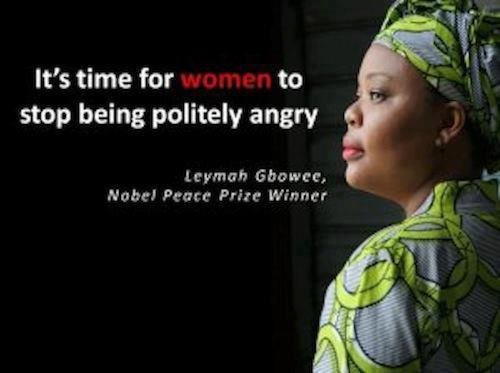7 things every woman needs to speak truth to power
Jan 21, 2015
Story


Financial mismanagement. Lay-offs of local and international staff. Inappropriate conduct by leadership. Finally, a visit planned from headquarters to see what’s going on. What do you do?
A superior continues to make passes at you. You find out you’re paid less than someone doing your exact same job. Someone takes undue credit for work you did. Why does this panel have only old, white men?!?
There are times in our aid careers when playing nice is no longer in our best interests. Telling a donor or a boss to go fly a kite is an intimidating experience, but there is a point when we have to speak up, no matter how uncomfortable we may be or how much power someone else has.
And unfortunately the aid world is still a boy’s game. While we’re represented among the workforce in proportional numbers, this is not the case among the leadership. We are going by their rules.
Oh wait, their rules don’t work for us? Guess we have to stand up for ourselves and change those rules. This will not happen by letting power go unchecked or unchallenged, on a personal or a sectoral level.
From my experience, here are seven things that can make these encounters a little less frightening.
1) Anger as fuel. As women, we’re often taught to keep the peace. At age #%, I still struggle with expressing anger. I unfortunately know its ability to damage relationships. But I’ve also learned that anger can be a powerful force if I can stay with it and transform it as energy to carry me through a necessary confrontation.
2) An ever-thickening, yet still permeable skin. When I first took a course with The Op-Ed Project (highly recommended), they told us that stepping into the public space would require a thick skin. They were certainly right. Due or undue, look at the backlash Sheryl Sandberg has received. When speaking truth to power, you will receive criticism yourself. Some of it will need to bounce right off your exterior. Some of it will be necessary to move you to the next level.
3) Use of the powerful’s own language and tactics. Like it or not, sometime we’ll have to “play the game” in order to get the access to change the rules. I tend to favor infiltration and influence. But the words of a friend and fellow writer often also ring in my ear, “Sometimes, you also have to also scream and yell to get a seat at the table.”
4) Your peeps. Perhaps Sheryl Sandberg might have gotten further if she advised women not only to lean in, but to lean on each other. I tend the tribe as another source of my power. Allies ground me, validate me, are friendly adversaries, help lick my wounds, and share their own tales of speaking truth to power. Invaluable.
5) A new definition of vulnerability. Powerlessness is only a perception. But I find that if I can acknowledge my own vulnerability, I can find a more secure place from which to advocate. In fact, my vulnerability emboldens me in a way, knowing that push-backs are necessary.
6) A back-up plan. Whistleblowers often have to start anew. It’s the price they pay for speaking truth to power. But personal risk is often over-estimated. Bureaucracies and organizations benefit from our fear of losing our jobs. But we are not our organizations and it is foolish to equate income with security.
7) A touch of bravado. Speaking truth to power often means women are seen as loud-mouthed, cut-throat, self-righteous, hot-tempered, over emotional, unfeminine. A bitch you say? You can be afraid of these labels. I still am at times. But then I take a deep breath, remember to play big, and let it rip anyway. Desiree Adaway says it best, “It’s ok to be the smartest, savviest, most awesome person in the room…and have a vagina.”
Why do I think it’s important for women to speak truth to power? Because half the story is still not fully represented in the discourse. In the same way that we are not only whores or mothers, women working in aid and development are not only saviors or victims.
So let her rip.
***
A version of this post first appeared on the Women Working in Aid and Development blog.




